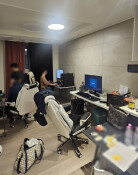[Column] Sunshine and thunderstorm
[Column] Sunshine and thunderstorm
Posted February. 28, 2001 11:53,
As President Kim Dae Jung prepares to visit Washington next week, it appears that his "Sunshine Policy" toward North Korea might just possibly be working despite a lack of much concrete accomplishment and the misgivings of many skeptics. Even so, success would contain inherent dangers.
American officials said President Bush could be expected to tell President Kim that the Bush administration supports President Kim`s conciliatory approach to North Korea but that he is less interested in direct engagement with North Korea than was the administration of President Clinton.
Instead, President Bush was expected to say, the U.S. will follow the leadership of South Korea in dealing with the North even as Washington continues to negotiate cautiously with Pyongyang. "We will not interfere in the North-South process," said a senior official. In contrast, the Clinton Administration often barely kept Seoul informed as it negotiated with Pyongyang.
After President Kim`s meeting in Pyongyang with General Secretary Kim Jong-Il last June, clouds of euphoria billowed across Korea, much of the rest of Asia, and into North America and Western Europe among those who pay attention to Korea.
At the same time, many "old Korea hands," this writer among them, were dubious. Too often in the past, the promise of progress toward reconciliation had been shattered by North Korean belligerence and violence.
Today, eight months after the summit, there are glimmerings that the skeptics have been wrong. Robert Scalapino, the prominent American scholar who specializes in Asia, told an audience in Los Angeles two weeks ago there "is reason for hope that a new course has been launched even though the outcome is uncertain."
Curiously, signs of hope are seen more in what has not happened rather than in what has happened. The North Koreans have repeatedly threatened violence but have not carried it out. Pyongyang`s propaganda blasts against South Korea, Japan, and the U.S. have continued but have been muted. On the positive side, Pyongyang has opened diplomatic relations with several Western nations, the latest being Spain and Canada.
The U.S. Director of Central Intelligence, George Tenet, told Congress recently: "Pyongyang`s bold diplomatic outreach to the international community and engagement with South Korea reflect a significant change in strategy. This strategy is designed to assure the continued survival of Kim Jong-Il`s regime by ending Pyongyang`s political isolation and fixing the North`s failing economy by attracting more aid."
Trying to read the mind of Kim Jong Il to determine why he has changed strategy after years hostility would be an exercise in futility; the chances of being mistaken are exceedingly high. Even so, it seems that nearly a decade of economic disaster, famine, and poor health care in North Korea may finally have penetrated the consciousness of Pyongyang`s topmost circle.
A new emphasis on the economy has become evident. Kim Jong Il appears to have learned that a muscular military force, to which he gives highest priority, is dependent on a strong economy. He may be following the example of Japan in the late 19th century, when the slogan was "Rich Country, Strong Army." In a White Paper last year, China appears to have adopted the same course.
A New Year`s editorial that ran in Pyongyang`s controlled press lit a beacon even if it ignored the nation`s economic quagmire: "We should consolidate our powerful national economy to meet the requirements of the new era of the revolution with army-first policy."
Two-weeks later, Kim Jong Il startled the world with a swiftly arranged visit to China, there to be greeted by Prime Minister Zhu Rongji, China`s foremost advocate of economic reform, and to spend most of his time in Shanghai, perhaps the least socialistic and most capitalistic city in China.
Escorted by Prime Minster Zhu, Kim Jong Il traipsed through an automotive plant in which General Motors of the U.S. was a prime investor and an electronic plant in which NEC of Japan was a partner. The North Korean entourage also visited Shanghai Bell, another company with American investors, and Shanghai Baosteel, which is looking to foreign investors for modern technology and financing.
The message was clear: If Dear Leader Kim wants to revive the devastated economy of North Korea, he will need outside help. Some of that help might come from China but more likely prospects are Japan and the United States. Tokyo and Washington have made clear, however, that their aid will depend on North Korea`s responses to President Kim Dae-Jung`s "Sunshine Policy." If Kim Jong-Il does not respond, North Korea could well remain in its economic morass. If he does, that may let in South Korean, Japanese, and American influences that could erode Kim Jong-Il`s hold on power. As CIA Director Tenet told Congress: "Sudden, radical change remains a real possibility in North Korea."
But, and this is a big but, a successful "Sunshine Policy" could produce a dilemma for South Korea. Economic benefits in North Korea are not likely to go to the people but to the army. Seoul may thus be fueling the very force that still intends to conquer all of Korea.
In that case, sunshine might give way to a raging thunderstorm.
by Richard Halloran, an independent writer contributing to Asian issues, before Asian correspondent, the New York Times




![[김순덕 칼럼]팥쥐 엄마 ‘원펜타스 장관’에게 700조 예산 맡길 수 있나](https://dimg.donga.com/c/138/175/90/1/wps/NEWS/IMAGE/2026/01/21/133206359.1.jpg)


